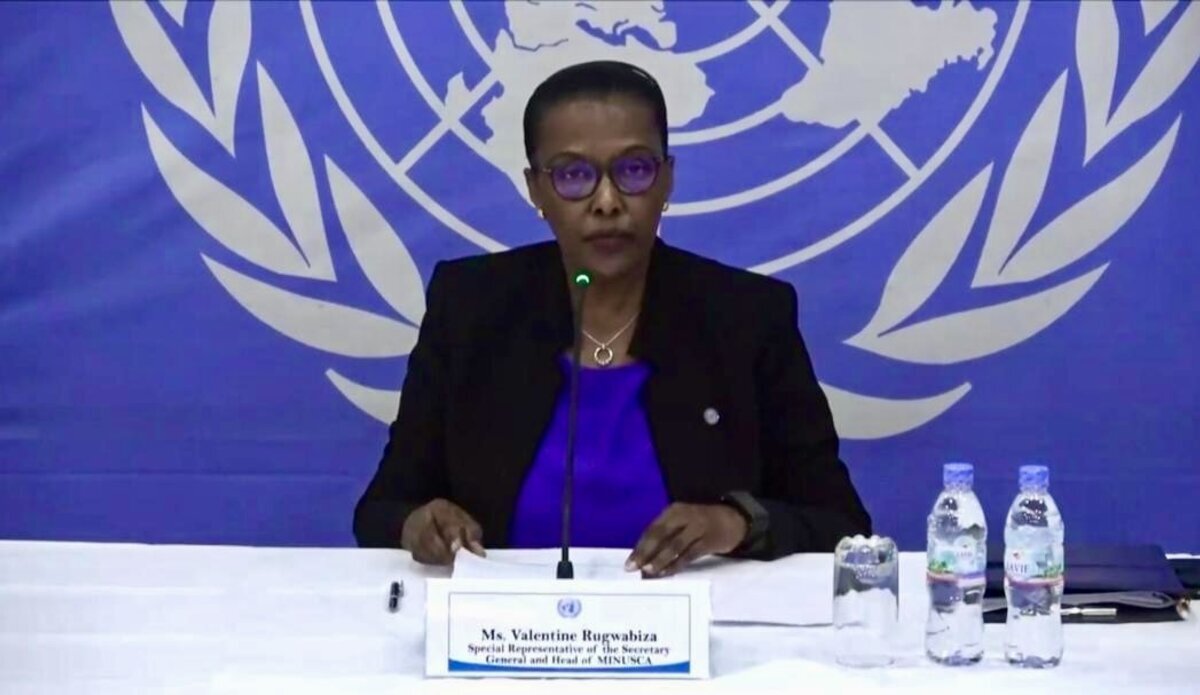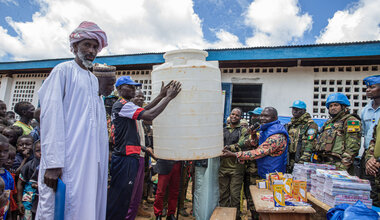Special Representative of the Secretary-General statement to the UN Security Council
- Mr. President of the Security Council,
- Distinguished Members of the Council,
- Madame Minister of Foreign Affairs, Francophonie and Central Africans Abroad of the Central African Republic,
Mr. President,
- I would like to congratulate South Korea in assuming the Presidency of the Council for the month of June, and I take this opportunity to thank you for chairing this session. I am indeed honored to present the most recent report of the Secretary-General on the Central African Republic. I will first underscore some achievements of the Mission in delivering its mandate, in support of the implementation of the political agreement for peace and reconciliation in Central Africa. I will then elaborate on the extension of MINUSCA’s footprint to additional localities in Haut Mbomou prefecture, in the southeast of Central African Republic, paving the way for extension and restoration of civilian and security State Authority in this region. Last, I will also share with the Council some of the operational challenges faced by the mission during this reporting period.
Distinguished Members of the Council,
- On 17th April, Central African Republic National Border Management Commission, held its inaugural plenary session, and is since actively implementing its ten-year action plan under the leadership of the Ministry of Territorial Administration, Decentralization and Local Development. The limited to no state presence in border areas has historically provided a fertile ground for cross-border insecurity in the Central Africa. Restauration of state authority and border management control constitute priority pillars of the APPR-RCA and Luanda roadmap; to anchor security of border areas as the bedrock for the full restoration and consolidation of durable security in Central Africa.
- Yesterday in Bangui, the joint sessions of the ad hoc Borders Commission and the Permanent Joint Commission on Cross-Border Security, between the Republic of Cameroon and the Central African Republic, commenced their deliberations, demonstrating the political resolve of both governments to address border security, transhumance issues, illegal trafficking, and common border issues through the revitalization of existing cross-border cooperation mechanisms.
Distinguished Members of the Council,
- Past and recurrent political and security crises in the Central Africa Republic, have negatively impacted transhumance, turning a secular practice into one of the main triggers of attacks against the civilians. The recent killing of 16 civilians in Limé village in the Ouham-Pendé prefecture, following a land conflict involving local farmers and cattle owners, was a stark reminder of the urgency to reverse the dynamics of violence and to reposition livestock farming and transhumance as factors of peaceful coexistence, stabilization and economic development.
- On 13 May, the President of the Republic and Head of State presided over the first high-level national conference on peaceful and prosperous transhumance. The high-level conference, facilitated by MINUSCA, agreed to the following decisions: update the legal and institutional framework on transhumance corridors, support to local conflict prevention mechanisms, leverage existing cross-border mechanisms to manage cross-border transhumance. Implementation of these decisions will significantly improve transhumance management, which should be recalled, is a pillar of the APPR-RCA.
Distinguished Members of the Council,
- The preparations for local elections have gained momentum, with the adoption of the revised electoral code by the National Assembly on 28 May, and recent financial contributions to the UNDP basket fund. As previously stated, local elections are a key provision of the political agreement. The Mission will continue to provide mandated multifaceted support to the preparations of local elections, including through awareness raising activities to mobilize broad participation, in particular the full and safe participation of women. We welcome the contributions made by some Members, appreciate the ongoing mobilization efforts by the President of the Peacebuilding Commission configuration on Central African Republic, and encourage all Members, to extend support to the Central African Republic municipal elections which were last held 36 years ago.
Mr. President, Distinguished Members of the Council,
- The security situation remains challenging in border areas. The Haut-Mbomou prefecture, in the southeast of Central Africa Republic, witnessed an intensification of the violence against the civilians, amidst an escalation of the conflict and retaliation attacks between elements of the UPC armed group and Azande self-defense group. As members of the Council will recall, the Mission first expanded its footprint to the locality of Mboki in the Haut Mboumou and supported the deployment of the national armed forces in 2023, which in turn enabled demobilization, disarmament and repatriation of LRA combatants and their dependents to Uganda. Following the deterioration of the security situation early this year, MINUSCA further expanded its footprint, its Force footprint in the prefecture to prevent further outbreak of violence. In parallel, the Mission mobilized its limited engineering and logistical capabilities to improve ground access to Haut Mbomou prefecture, an area which is bigger than Switzerland, and almost the size of Sierra Leone, an area which is inaccessible by ground transportation during long rainy seasons in Central Africa.
- The expansion of the Force footprint has enabled the Mission to extend the implementation of its mandated priority tasks in the prefecture, notably protection of civilians, facilitation of humanitarian assistance delivery, and paved the way for the extension of civilian and security state authority, through the ongoing rehabilitation of the Bangassou-Obo-Bambouti axis.
- Within a short time, working closely with national and local authorities, local communities, and humanitarians’ partners, the Mission is making tangible and transformative progress on the security, humanitarian, and peacebuilding fronts in Haut-Mbomou. Turning now to another border area, in Am-Dafock, at the border with Sudan, on April 6th, MINUSCA facilitated the deployment of national defense forces, in support to extension of Central Africa state authority.
Distinguished Members of the Council,
- Notwithstanding progress registered in MINUSCA’s mandate implementation during the covered reporting period, I am deeply concerned by the continuous misinformation and disinformation campaigns against the Mission, with an uptake in the hostile content targeting MINUSCA. This further complicates the already-challenging context in which the Mission operates. I call on the Government to hold accountable identified individuals, including public servants, channeling and echoing such campaigns, which pose a significant risk to the safety and security of our peacekeepers while constraining the Mission ability to optimally implement tasks mandated by the Council and requested by Central African national authorities. I am also preoccupied by the slow progress with the release of Mission’s equipment seized by national customs, despite the mission repeated engagements with relevant government institutions.
Mr. President, Distinguished Members of the Council,
- I would like to conclude my statement by sincerely thanking members of the Council for the consistent support extended to MINUSCA over the years. To sustain and consolidate gains achieved by the Mission will require your continued support and the Government continued investments in building capabilities of its national institutions, including security institutions to enable them to fulfill the Government primary responsibility to protect its population, and sovereignty of its national territory.
I thank you for your kind attention.
 UN
UN United Nations Peacekeeping
United Nations Peacekeeping





